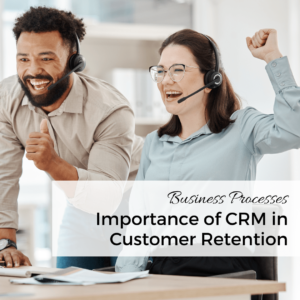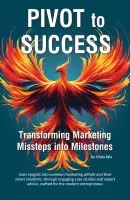Ready to Elevate Your Marketing Strategy?
Unlock the expertise of a Fractional CMO and take your business to the next level. Limited spots available.

Retaining customers is not just a strategy; it’s a lifeline for entrepreneurs. The relationship between a business and its customers is akin to a delicate dance, where every step must be in perfect harmony. Customer Relationship Management (CRM) is the choreographer of this dance, ensuring that businesses not only retain their existing customers but also foster loyalty and enhance satisfaction. Understanding the importance of CRM in customer retention is vital.
Customer Relationship Management is not a new concept, but its application and importance have evolved significantly with the rise of technology and customer expectations. Let’s delve into why CRM is a crucial aspect of customer retention.
Customer engagement is not a one-time event; it’s a continuous process that requires attention, care, and innovation. CRM is the tool that makes this process manageable and effective. A digital CRM can help make sure that follow-up with any prospects never falls through the cracks.
Here’s how:
Trust is the cornerstone of any relationship, and the relationship between a business and its customers is no different. CRM allows businesses to maintain transparency in their dealings, providing customers with insights into how their data is used and why certain products or services are recommended. This transparency builds trust, a vital component in retaining customers.
For Vicky Wu Marketing, trust is not just a word; it’s a commitment. Having worked with huge corporations with really deep pockets, I have seen the strategies they use to make sure trust is built and maintained.
Customers are not just numbers in a database; they are individuals with emotions, preferences, and expectations. CRM helps in understanding these emotions and creating connections that go beyond mere transactions. By sending personalized messages on special occasions or acknowledging customer feedback, businesses can create emotional connections that last.
In today’s digital age, technology is not an option; it’s a necessity. CRM leverages technology to enhance customer experience, providing them with seamless interactions, whether it’s online shopping or customer support. The integration of AI, chatbots, and analytics ensures that customer experience is not just satisfactory; it’s exceptional.
In the vast landscape of CRM solutions, choosing the right one can be a daunting task, especially for growing businesses without dedicated marketing teams. The right CRM is not just about features; it’s about alignment with your business goals, budget, and unique needs. Here’s a guide to help you make the right choice:
Before diving into the plethora of CRM options, it’s essential to understand your specific needs. Are you looking for automation? Do you need integration with existing systems? What’s your budget? Answering these questions will narrow down your choices and align the CRM with your business objectives.
For businesses without dedicated marketing teams, automation is a game-changer. Automation in CRM can handle repetitive tasks such as sending follow-up emails, segmenting customers, or even managing leads. This automation frees up valuable time, allowing you to focus on what you do best – growing your business.
Over my decades of working with all different types of businesses, I have also worked with almost every CRM that exists. Some have so many bells and whistles – and the associated cost – that most SMBs will never need to use (and have no reason to pay for). Others that have pricing that is more realistic for smaller businesses may not have enough capabilities.
One of the most important features I always look for is automations. Some CRMs limit the number of automated workflows that you can have when you are on lower tiers. Two of my favorites are HubSpot, since the free tier can help with the basics but limits you to five workflows (not enough for me!); and hands down, Dubsado is my favorite for service-based businesses because of the unlimited workflows available. Both of these are great for service-based businesses, but also may not be best for products, so choosing the right CRM for you really depends upon your unique needs.
I always say how technology should work for you, and be able to serve almost like another member of your team, instead of you having to work so hard at it. Finding the right CRM can actually meet this goal.
Customer Relationship Management is not just a tool; it’s a philosophy that embodies the essence of customer-centricity. It’s about understanding, engaging, and retaining customers in a way that resonates with their needs and expectations. For businesses looking to grow, especially those in the entrepreneurial space, CRM is not an option; it’s a necessity.
Vicky Wu Marketing embodies this philosophy, providing entrepreneurs with strategies that are not just effective but empathetic. With a focus on bespoke and holistic strategies, we know that a CRM is not just implemented but integrated into the very fabric of the business strategy.
With a track record that spans over 30 years and a passion that resonates in every strategy, Vicky Wu Marketing is not just a marketing agency; it’s a partner in your entrepreneurial journey. If you’re looking to understand the importance of CRM in customer retention, you’re in the right place. Vicky Wu Marketing is here to guide you, support you, and help you succeed.
Ready to Elevate Your Marketing Strategy?
Unlock the expertise of a Fractional CMO and take your business to the next level. Limited spots available.

Vicky is the CEO and Chief Creative Strategist of Vicky Wu Marketing. She draws from 30 years of experience at the CMO level, the CEO level, marketing for Fortune 500 companies and multi-million and multi-billion-dollar organizations, PLUS strategies learned helping startups and nonprofits with limited budgets … now focusing on providing SMBs with effective and efficient marketing strategies – giving them access to the same level of expertise as the really big guys with deep pockets, that they may not otherwise be able to access.
Get solid marketing strategies, designed for entrepreneurs on the track to 7-figures and beyond, right in your inbox.

